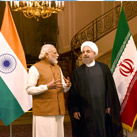Yaalon’s Visit and the India-Israel Defence Relationship
The Modi’s government determination to adopt a muscular stance on national security and its commitment to expedite defence modernisation are likely to translate into greater political and defence engagement with Israel.
- S. Samuel C. Rajiv |
- February 19, 2015 |













